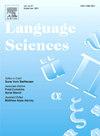支持非动词的动词
IF 1.1
2区 文学
Q2 EDUCATION & EDUCATIONAL RESEARCH
引用次数: 0
摘要
在支持动词结构(SVC)中,如have poise,支持动词被明确地假定为动词,这里是have。然而,在过去的50年里,SVC的概念已经扩展到大范围的新病例。在这个新的范围内,充当支持动词角色的语言形式也可以是不被归类为动词的表达,例如be mad With,或者是形容词,例如韩语中的“有”。把“支持动词”称为非动词是一个术语问题。除此之外,本文还探讨了扩展svc定义的有效性。在调查了利害关系的语言形式和对这种扩展的反应之后,我们将重点放在根据标准划分历史上严格意义上的svc上,以一种与传统直觉相匹配的方式。然后,对于每一种被提出作为延伸的语言形式,我们检查延伸在多大程度上扭曲了这个概念。我们发现SVC和SVC的扩展在语法和词汇模型中都很有趣。最后,“动词”的词性对任何类别来说都不是必需的,这就建议采用“支持结构”和“支持结构的延伸”来代替。本文章由计算机程序翻译,如有差异,请以英文原文为准。
Support verbs that are not verbs
In support verb constructions (SVC), as have poise, the support verb is explicitly assumed to be a verb, here have. However, during the last 50 years, the notion of SVC has been extended to a large range of new cases. With this new scope, the linguistic form that plays the role of the support verb can also be an expression not classified as a verb, such as be mad with, or an adjective, e.g. 있다 issta ‘there is’ in Korean.
Calling ‘support verb’ a non-verb is a terminological issue. Beyond that, this article examines the validity of extending the definition of SVCs. After surveying the linguistic forms at stake and the reactions to such extension, we focus on delimiting the historical, stricto sensu SVCs based on criteria, in a way that matches the traditional intuition. Then, for each type of linguistic form proposed as an extension, we examine how far the extension distorts this notion. We find both SVCs and extensions of SVC to be of interest in a model of syntax and the lexicon. Finally, the ‘verb’ part of speech is not essential to any of the categories, which suggests adopting the terms of ‘support construction’ and ‘extension of support construction’ instead.
求助全文
通过发布文献求助,成功后即可免费获取论文全文。
去求助
来源期刊

Language Sciences
Multiple-
CiteScore
2.90
自引率
0.00%
发文量
38
期刊介绍:
Language Sciences is a forum for debate, conducted so as to be of interest to the widest possible audience, on conceptual and theoretical issues in the various branches of general linguistics. The journal is also concerned with bringing to linguists attention current thinking about language within disciplines other than linguistics itself; relevant contributions from anthropologists, philosophers, psychologists and sociologists, among others, will be warmly received. In addition, the Editor is particularly keen to encourage the submission of essays on topics in the history and philosophy of language studies, and review articles discussing the import of significant recent works on language and linguistics.
 求助内容:
求助内容: 应助结果提醒方式:
应助结果提醒方式:


